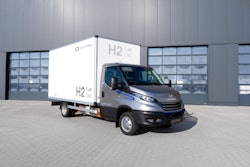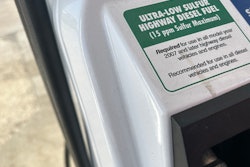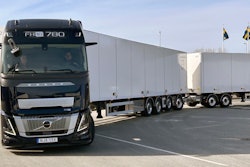Trucking news and briefs for Friday, May 3, 2024:
New project to deploy 30 hydrogen fuel cell trucks in Oakland
In a dedication event at the FirstElement Hydrogen Fueling station in West Oakland on Thursday, the Center for Transportation and the Environment (CTE) celebrated the official launch of NorCAL ZERO, a new project bringing zero-emission freight transportation to the Bay Area and Central Valley.
The project is a $53 million collaborative effort to deploy 30 units of Hyundai Motor Company's Class 8 XCIENT Fuel Cell electric trucks.
 CTE projects that the NorCAL ZERO project has the potential to avoid 24,362 metric tons of carbon-dioxide emissions equivalent to 2,393,124 gallons of diesel consumed, while also improving public health over the six-year operation of these trucks.Tyler Jacobsen
CTE projects that the NorCAL ZERO project has the potential to avoid 24,362 metric tons of carbon-dioxide emissions equivalent to 2,393,124 gallons of diesel consumed, while also improving public health over the six-year operation of these trucks.Tyler Jacobsen
“Each diesel truck we replace with hydrogen helps clean the air – which has tremendous public health benefits,” said Tyson Eckerle, Senior Advisor for Clean Infrastructure & Mobility at the Governor’s Office of Business and Economic Development. “This project is a true trailblazer on so many levels, and a head start on the future we plan to build through the Alliance for Renewable Clean Hydrogen Energy Systems (ARCHES) federal hydrogen hub.”
The project is funded in part with $11.98 million from CARB’s California Climate Investments Program, $9.89 million from the CEC’s Clean Transportation Program, $3.64 million from Alameda CTC’s Clean Freight Program, $3.36 million from BAAQMD, and $24 million from project partners.
Hyundai Motor Company designed and manufactured the vehicles, which are operated by G.E.T. Freight, a truck-based freight transport business of Glovis America, hauling containers from the Port of Oakland, and cars from the Port of Richmond.
The trucks refuel at the recently opened high-capacity and high-throughput liquid hydrogen fueling station built and operated by FirstElement Fuel. The hydrogen station is the largest in the world and has been designed to support up to 200 trucks and back-to-back refueling, CTE said in a press release.
Papé Group maintains the trucks at its San Leandro facility, where technicians receive in-depth training from Hyundai on how to service the trucks. With engineering and design support from the Fiedler Group, Papé Group also upgraded its maintenance facility with hydrogen detection and ventilation equipment to safely service the trucks. Additionally, the University of California Berkeley and the West Oakland Environmental Indicators Project are assisting with data collection, community outreach efforts, and communication.
[Related: Hyundai's XCIENT fuel cell truck makes its commercial debut]
FMCSA proposes to incorporate new CVSA handbook into regs
The Federal Motor Carrier Safety Administration is proposing amendments to its Hazardous Materials Safety Permits (HMSPs) regulations to incorporate by reference the updated Commercial Vehicle Safety Alliance handbook.
The updated handbook contains inspection procedures and Out-of-Service Criteria (OOSC) for inspections of shipments of transuranic waste and highway route-controlled quantities (HRCQs) of radioactive material (RAM), part of CVSA’s Level VI inspection program.
FMCSA said federal regulations currently reference the April 1, 2023, edition of CVSA’s handbook, and it is now proposing to incorporate the April 1, 2024, edition. As previously reported, there are 11 changes in the 2024 edition that distinguish it from the 2023 edition. The full list of changes can be found here.
FMCSA will accept public comments on the proposal to incorporate the new handbook for 30 days beginning Friday, May 3. Comments can be made at www.regulations.gov by searching Docket No. FMCSA-2024-0073 when the notice publishes Friday in the Federal Register.
[Related: CVSA's new out-of-service criteria: What truckers need to know]
Fuel card provider AtoB now accepted at TA
AtoB, a fuel card provider founded in 2020, announced this week a collaboration with TravelCenters of America.
The company said the partnership will bring a cost savings of an average of 42 cents per gallon, providing AtoB users with competitive prices on fuel at any of TA’s over 300 locations nationwide.
“At TA, we are constantly seeking opportunities to enhance the guest experience and better serve our fleet customers and professional drivers,” said Debi Boffa, CEO of TA. “AtoB is a platform that will save our customers time and money, and we are pleased to work with a company that is at the forefront of digitizing and modernizing the trucking industry.”
AtoB Fuel Cards help prevent fuel fraud, enable custom controls for more efficient fleet management, and offer savings on diesel gallons, the company said. The AtoB Driver App gives fleets visibility into fuel prices per gallon and the option to easily navigate to the closest TA location.
“Drivers can also use the Fuel Map in the AtoB Driver App to find stations with the best fuel prices and cost savings,” said Vedant Khamesra, Lead Product Manager, digital payments at AtoB. “AtoB users can utilize the platform at TA travel centers and diesel fuel pumps. In addition, the AtoB Perks program allows fleets to receive significant savings on fuel costs, tires and vehicle maintenance.”










